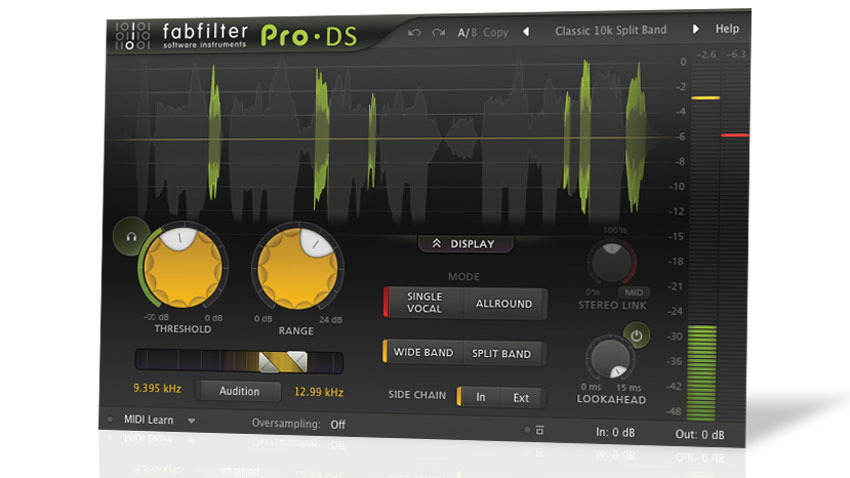MusicRadar Verdict
If you need a de-esser, you'll sssstruggle to find better than FabFilter's utterly comprehensive solution.
Pros
- +
Monitoring of removed signal. Excellent smart vocal algorithm. Low latency and oversampling modes. Works on single tracks and full mixes. Mid-side and stereo linked operation. Excellent visual display.
Cons
- -
Fittingly high price.
MusicRadar's got your back
In spite of the pro-spec virtual processing tools available to us all these days, one thing many of us still struggle to achieve is that elusive 'pro vocal'. As part of the quest, we throw huge amounts of compression at our singers, but that creates a new problem: sibilance.
These harsh 'sss' sounds are an unavoidable side-effect of heavy compression, and they add a harsh edge that makes our loud vocal sound more like it was recorded in a nightclub than Abbey Road. Enter the de-esser.
"Pro-DS is unusual in that it's designed not just for use on vocals, but any material with sharp, high-frequency content such as complete tracks or live drums"
De-essing was originally done by feeding a vocal signal into an EQ and removing everything except the high frequencies (where sibilance resides), then whacking it into the sidechain of a compressor with the un-EQ'ed vocal running into the normal compressor input. These days, we need to compress harder than ever to help our vocals cut through. Conventional de-essing methods just don't cut it like they used to, but FabFilter may have the answer...
Pro-DS (VST/VST3/AU/RTAS/AAX) is unusual in that it's designed not just for use on vocals, but any material with sharp, high-frequency content such as complete tracks or live drums. It features two distinct modes of operation: the Single Vocal mode that intelligently works out which parts of a vocal signal are sibilance, and the Allround mode that focuses on a selected sidechain range.
FabFilter is, of course, quite cagey about the algorithms it employs, but you only need throw the plugin across a vocal channel or your master output and dial in some reduction to hear that they work brilliantly. A common side-effect of de-essing is the introduction of a lisping quality, but Pro-DS lets you go a long way before this starts to happen.
Pro-DS has another trick up its sleeve: its choice of wide- or split-band operation. Wideband offers traditional attenuation across the selected frequency band and is, as FabFilter suggest, more natural on vocals. Split separates the upper and lower frequencies, making it ideal for taming drum loops and mastering full tracks.
Taking the hiss
"Pro-DS offers more visual feedback than any de-esser we've ever used, and it's no gimmick, either"
Pro-DS offers more visual feedback than any de-esser we've ever used, and it's no gimmick, either. The main Threshold dial has a collar meter that shows the signal reduction level, while the sidechain Range also has its own meter, showing the concentration of signal and helping you zone in on the sibilance.
There are master signal and gain reduction meters too, and all of that's before you even get to the whopping great waveform display that shows you how much reduction is taking place and where. Out of curiosity, we tried setting up Pro-DS on a vocal with the channel muted, just using the metering and waveform display, and the results were comparable to what we got on the same vocal using two other leading de-essers with the sound switched on.
We didn't expect to run out of space writing about such a seemingly simple plugin, but we barely have room left to gush about the lookahead function, the great presets, the mid/ side functionality, oversampling, the removed signal and sidechain signal auditioning, and the low latency operation (in wideband mode).
Pro-DS isn't something that everyone needs, certainly, but anybody who regularly deals with vocals and/or sampled drum loops certainly wouldn't regret investing in it.
Computer Music magazine is the world’s best selling publication dedicated solely to making great music with your Mac or PC computer. Each issue it brings its lucky readers the best in cutting-edge tutorials, need-to-know, expert software reviews and even all the tools you actually need to make great music today, courtesy of our legendary CM Plugin Suite.
“A synthesizer that is both easy to use and fun to play whilst maintaining a decent degree of programming depth and flexibility”: PWM Mantis review
“I feel like that song had everything we needed to come back with”: Bring Me The Horizon’s Lee Malia on Shadow Moses, its riff and the secrets behind its tone, and why it was the right anthem at the right time
“I said, ‘Are we sure we can write a song about death?’”: The story of Mike + The Mechanics' classic No.1 The Living Years











